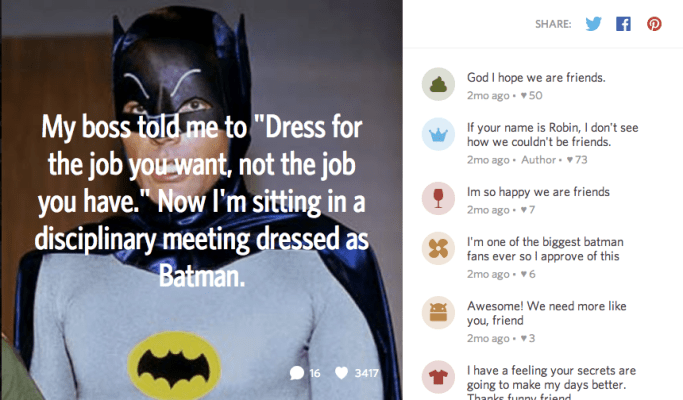Secret, the app that lets users share notes with others without revealing their identity, has attracted a lot of controversy (or celebration, depending on who you are) for how it enables the spread of racy but sometimes mean or simply controversial notes about people, places and things. But it is also attracting a lot of something else: moolah.
Today, the startup co-founded by ex-Googlers Chrys Bader-Wechseler and David Byttow has announced that it has raised another $25 million in funding. The Series B round includes Index Ventures, Redpoint Ventures, Garry Tan and Alexis Ohanian, SV Angel, Fuel Capital, Ceyuan Ventures, and — fittingly — “several others that shall remain a secret.”
Index’s Danny Rimer is joining the startup’s board of directors. The company has now raised just over $36 million, with other investors including Google Ventures, Joe Montana (!), Kleiner Perkins, David Sacks and many more. The NYT notes that this latest round values the company at over $100 million.
On top of this, Secret is adding two new features: A digest it is calling “Secret Collections” and the ability to log in using Facebook, which it says has been its most-requested feature.
There are two key things to note about the Facebook login. The first is that it will expand your Secret network beyond the contacts that you have in your mobile phone contact book; in the past this has been the primary way that Secret links up your network on the app, with friends and friends of friends being the only ones that can comment on each others’ posts; geographical or more distant connections cannot.
The second is that even when you log in with Facebook, your content will not be shared there — it will remain completely anonymous, the company says. “Yes it’s anonymous, we don’t even store your public name,” the company notes in its blog post.
The collections, meanwhile, is Secret’s attempt at further curation, with users getting the ability to “subscribe” to topics. “The conversations about work, love, loss and even food that have traveled far and wide through Secret give you a sense of what people are really feeling,” the company writes. Collections will appear in a users’ main Explore stream and looks to be just the beginning of how the company will further shape the app.
“This is a first step in giving users more control over their experience on Secret,” the company writes.
Over the last several months, Secret has been making moves to help scale out its service to a wider audience. That’s included adding an Android app to its original iOS app, and opening the app to users outside of the U.S., and letting people key into secrets near them, even when not from their more immediate circle.
A spokesperson says that the app is not disclosing user numbers. “Growth in U.S. and particular countries, like Netherlands, Russia and China has been promising and exciting,” she adds. “Our next six months will be focused on continuing this growth and engagement.”
The company has also been making efforts to make sure that people “Say something kind,” as the prompt notes in the text box on the app; and to let people flag and report content that is not.
It doesn’t stop all hurtful posts, or even pre-empt many of them, however. And that’s before you begin to consider how Secret will ultimately choose to deal with other kinds of content that you may want to see more of, or not at all — such as the profusion of secrets about sex.
Indeed, this is one area where Collections and other curation moves might come in handy. I could see a time, for example, when Secret may start to implement a “learning” algorithm, where it sees what kinds of posts you like to view, or flag those you do not, and shows you results that fit those parameters more closely.
As Secret moves — or tries to move — beyond the tech early adopters thus becoming a noisier experience, that kind of shaping will likely become even more essential.
